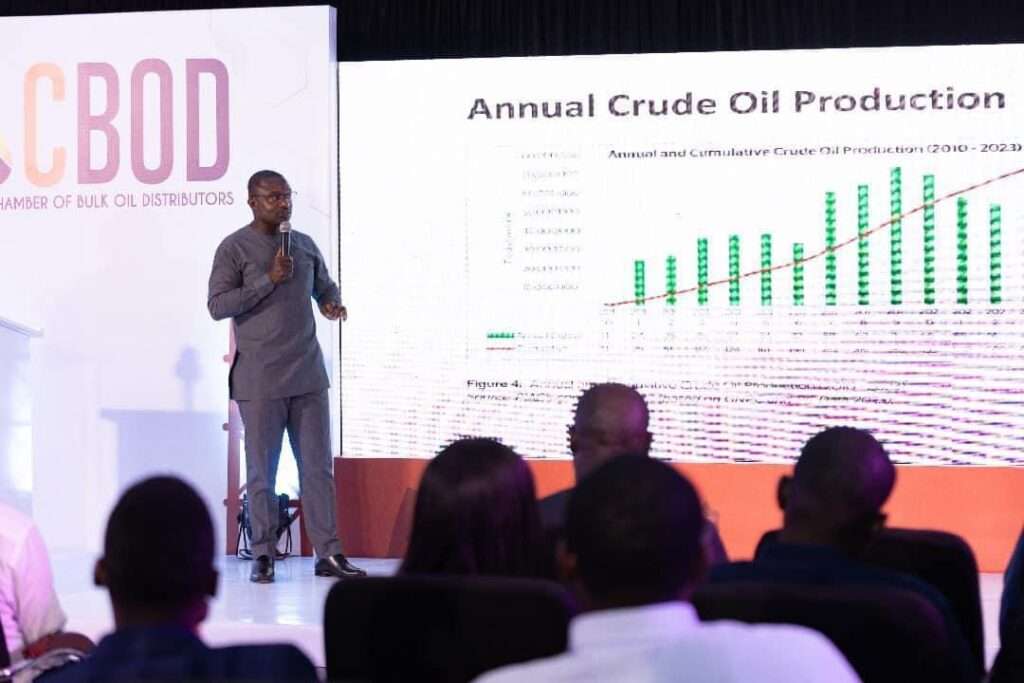The Chamber of Bulk Oil Distributors (CBOD) in Ghana recently organized an Energy Town-Hall Engagement. This event served as a platform for discussing key issues and policies in the energy sector, bringing together industry leaders, policymakers, and stakeholders.
The discussions focused on both upstream and downstream aspects of Ghana’s petroleum industry, aiming to address challenges and explore opportunities for growth and sustainability
At the event, the Hon. John Abdulai Jinapor, MP for Yapei Kusawgu and the Chair of the Energy Committee of the National Democratic Congress (NDC), rehashed the party’s energy policy proposals.
Hon. Jinapor used the occasion to outline NDC’s strategic vision for a resilient, sustainable, and inclusive energy sector that would not only meet Ghana’s growing energy needs but also position the country as a leading power exporter in West Africa.
Hon. Jinapor’s central arguments was the need for a “resilient, robust power sector,” which, according to him, must be interlinked with Ghana’s petroleum sector.
“We left a very robust gas-to-power era where when we’re living, we had enough gas. Today, we don’t have enough gas.
“The gas is inadequate, and so we would ensure that we put in place the mechanism to bring on board the second gas processing plant.”
Hon. John Abdulai Jinapor, MP and the Chair of the Energy Committee of the NDC
To address this, Jinapor promised the construction of a second gas processing plant, which would enhance the country’s gas supply and stabilize energy production. He emphasized that President Mahama had already engaged sector players, and they were confident there was enough raw gas to feed this proposed plant.
This initiative is crucial, considering the increasing demand for power in Ghana and neighboring countries. Jinapor underscored that boosting energy exports is a top priority for the NDC. “We want to increase power to neighboring countries,” he declared, positioning Ghana as a regional energy hub.
Additionally, Jinapor stressed the importance of adhering to the Energy Sector Levies Act (ESLA). He accused the current government of misusing these funds, which are meant for energy-related activities.
The NDC, he pledged, would ensure that these levies are used for their intended purposes, such as financing the petroleum sector and enhancing energy infrastructure.
One of the most compelling proposals was the introduction of a 24-hour economy, where businesses could operate round-the-clock, facilitated by reliable and affordable power supply. This concept is not new, but Jinapor defended its practicality, dismissing critics who claimed it was unrealistic.
“A key component of this 24-hour economy is the introduction of a time-of-use tariff system.
“This would offer incentives to industries and businesses that operate during off-peak hours, making energy more affordable and improving industrial efficiency.”
Hon. John Abdulai Jinapor, MP and the Chair of the Energy Committee of the NDC
Clean Energy Transition

Recognizing the global shift towards cleaner energy, Jinapor highlighted the NDC’s commitment to increasing the share of renewable energy in Ghana’s energy mix.
“We would increase renewable energy up to 10% of the national grid’s non-hydro power generation.”
Hon. John Abdulai Jinapor, MP and the Chair of the Energy Committee of the NDC
Meanwhile, Hon. Jinapor noted that the country’s hydropower potential is substantial, and should be reserved for industrial use.
Jinapor also unveiled plans to transition Ghana’s fishing sector towards cleaner energy by promoting rechargeable outboard motors powered by solar energy. These motors, capable of operating for 48 hours, would reduce reliance on fossil fuels, cut down on emissions, and align with the broader energy transition agenda.
By providing these renewable alternatives, Jinapor believes the NDC can reduce environmental degradation and promote the use of clean energy.
The NDC is determined to revisit the LPG cylinder recirculation model introduced during the Mahama administration. Jinapor noted that the consumption of LPG has declined under the current administration, reversing the 6% annual growth rate seen under the NDC.
By constructing a second gas processing plant, the party aims to achieve 100% domestic LPG supply, reducing reliance on imported LPG and addressing the issue of deforestation caused by the widespread use of charcoal.
Addressing Systemic Challenges in the Power Sector

A notable component of Jinapor’s speech was the NDC’s plan to restructure and improve the operational efficiency of Ghana’s power utilities.
Hon. Jinapor revealed that “government currently owes approximately GHS 1.8 billion to power utilities,” a debt that has crippled the sector’s ability to function efficiently.
The NDC plans to ensure that energy sector funds are transparently managed and used for their intended purposes, ultimately improving service delivery.
Jinapor also highlighted the urgent need for reform in the pricing and distribution of petroleum products.
He announced the NDC’s intention to construct an onshore pipeline from the western to the eastern regions of Ghana, enhancing the reliability and security of fuel supply. Moreover, the NDC would develop an additional mooring facility to meet the growing demand for petroleum products.
Throughout his presentation, John Jinapor emphasized the NDC’s commitment to transparency and accountability in the energy sector. He promised that, under a Mahama-led government, the party would collaborate closely with industry stakeholders to craft policies that serve the best interests of both businesses and consumers.
By restructuring regulatory frameworks, promoting local content, and ensuring the prudent use of resources, the NDC aims to restore credibility and trust in Ghana’s energy sector.
The policy initiatives outlined at the CBOD town-hall engagement touched on everything from clean energy transition to local content promotion, addressing systemic inefficiencies, and fostering transparency.
With a promise to restore credibility, reduce corruption, and promote fiscal responsibility, the NDC’s energy policy aims to build a sustainable energy future for Ghana — one that is not only reliable and affordable but also environmentally friendly and equitable.
As the 2024 elections approach, these proposals will undoubtedly be a cornerstone of the NDC’s platform, offering Ghanaians a clear alternative to the current administration’s energy policies.
READ ALSO: Moldova Goes To The Polls





















